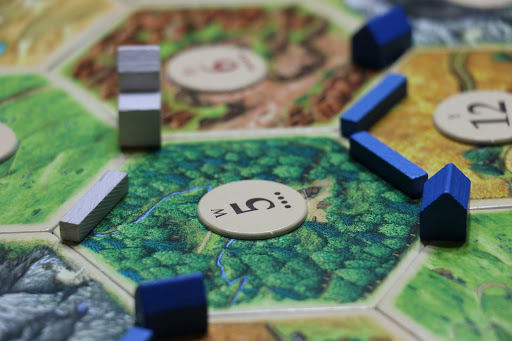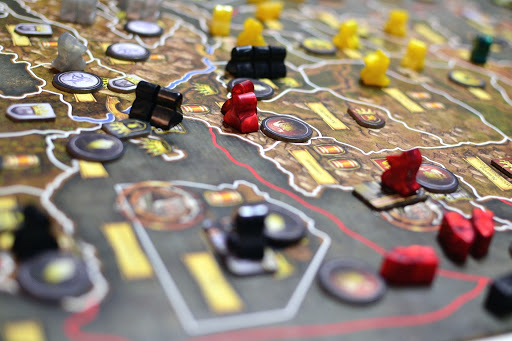
Board games come in all different shapes and sizes. While there is no one size fits all board game there are certainly positives to be said about any game you may be interested in playing. Board games, especially ones involving strategy are good for healthy brain development.
The gameplay is beneficial in many ways including the development of your brain’s frontal lobe and well as executive function control. Many families take time out of their busy lives to have regular family game nights because it has shown to help kids in many segments of life.
Board games can benefit not only children of course, as playing games has been shown to help ward off dementia. Games help the mind stay sharp and competitive and that spirited approach can really help you not only succeed intellectually but when playing all manner of card games, video games, and online tabletop games as well.
While every game is played differently there are some strategies for playing board games that remain key no matter which game you’re playing. These ideas may not work completely for the game you enjoy playing most but the spirit of the tip should ring true in a high percentage of the games you’re bound to encounter. (Feel free to substitute the word money for army etc.)
Play By Yourself
With many games giving you the ability to play as one player, getting some practice games played is a great way to find the perfect strategy for you. When you first begin to play a new board game it can be hard to figure out what your strategy should be as you’re still trying to grasp the rules and instructions.
So once a game is introduced to you set out to play it by yourself, even if it isn’t a one-player game. Getting deeply familiar with a game will bring you a sense of reassuring comfort so you can actually focus on creating a strategy and not keeping the rules straight.
But after you have played a few times and you understand the basic goal of the game, you are going to need to develop some strategies. There’s no better way to test out your strategies than by playing yourself. Whether your game is capable of being played one player or whether you control two different pieces or units you can see what works and what doesn’t.
Obviously, if without an opponent it can be difficult to see how a technique will hold us when you’re actually playing but nevertheless, playing solo can give you a competitive advantage in you can bank the knowledge you obtained and can pull from it in different scenarios you may face.
Think Economically

Because many games incorporate randomness into the gameplay there are risks to be taken with any strategy as you can never fully predict what will happen. While strategic board game enthusiasts can run a risk assessment before making their move when a game requires a specific role of the die or a drawing a certain card, there’s always a chance things could go poorly.
Yet, being skilled in assessing the possibility and the probability of each event will still only get you so far because of the randomness during play. In this case, you should bear in mind basic economic principles, especially when playing games involving resources or funds.
Just like in real life, whoever has the most money has a significant advantage during a game and can opt to bleed the opposing players dry based solely on the fact that they control the highest cash flow. Being conservative in giving up resources/armies/money can be a really sound gaming strategy.
It’s possible to have a great strategy while being creative and brilliant but still lose based solely on the fact that you cannot finance your gaming strategy. Therefore when you are playing a game with money or resources, collecting more money is never a bad strategy to have in place.
Be Flexible
As you develop your strategy for playing games you will have to make some key choices and then execute the choices while actually playing. You can use a strategy for the entire game attempting perhaps to earn as many points as possible. You can use a strategy for a number of turns such as collecting cards to eventually make a move that will earn you points.
But rarely can you enter a game and keep the same strategy throughout the entire time of gameplay. It is one thing to create a strategy in your mind and another to execute while playing. You can commit to your goal for a time but if an opponent begins to advance to quickly it may pay off to switch to your plan B.
Don’t get caught up in other people’s strategies. If your plan is to go on the offensive then go for it. If you’re always attacking no matter what, the other players will have no choice but to retreat and will not be able to achieve their own goals within the game.
However, The offensive strategy only works if you can achieve success, since as you advance your fellow competitors will likely retreat. In some games, this can result in a cat and mouse game that will become boring very quickly. Other times playing agressively will certainly pay off. Part of the fun and excitement of a board game is never really knowing what’s going to happen.
Being too conservative, especially in wargames isn’t going to result in a fun game. It’s key to remember that while winning is great, having a fun time with your gaming companions is also one of the reasons board games are so popular. While you should typically never make a move if you won’t survive the worst result of that attack if you aren’t having fun, what’s the point?
All the strategies in the world can’t account 4 random card drawings and what your opponent will be doing. That’s why part of having a good strategy is being flexible and adaptable with your gameplay actions. you need to be able to react quickly and make contingency plans no game is ever going to develop the same way twice so you have to be able to adapt.
Conclusion

It can be hard to break into a board game community that’s new to you, maybe these people have been playing for years but it’s important to remember that while board games can bring out negative traits in our personalities, they can also help you to see the strengths you have. Board games are a great way to expand your social relationships and to exercise your brain.
The more times you play a game the better you’ll be and the larger variety of games you are familiar with will give you more strategies to fall back on. Take some risks and focus on your strategies, once you start winning you won’t want to stop.

What do you think about using the Pub Battles system in the Japan Samurai war Before Edo ? As for me, i’m convinced that it can be possible. Welcome Sekgahara battle in 1600, Welcome Iga fighting in 1579, Welcome Shimbara rebellion in 1637, and a lot of others.
What do we need ?
Cavalry : OK with pub battles
Regular Infantry :OK with pub battles
Elite infantry : OK with pub battles
Milician infantry : OK with pub battles
Musketeer : +1 firing / -1 close combat
Generals : OK with pub battles
Different colors because often lords were allied or traitors :
Yellow – red – white – black – blue…. with standard infantry-cavalry-musketeer
Just we have to use a possibly non obedience by the allied
So, smell the idea and tell me when you make it to reality.
Do you think this would be better suited to Ancient Battles?
I Can’t say because I don’t play Ancient Battles. Just Memoir 44.